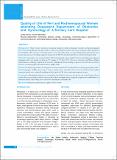Please use this identifier to cite or link to this item:
https://hdl.handle.net/20.500.14356/1580| Title: | Quality of Life of Peri and Postmenopausal Women attending Outpatient Department of Obstretics and Gynecology of A Tertiary Care Hospital |
| Authors: | Koirala, Sunita Manandhar, Naresh |
| Citation: | KoiralaS., & ManandharN. (2018). Quality of Life of Peri and Postmenopausal Women attending Outpatient Department of Obstretics and Gynecology of A Tertiary Care Hospital. Journal of Nepal Health Research Council, 16(1), 32-35. https://doi.org/10.33314/jnhrc.v16i1.1034 |
| Issue Date: | 2018 |
| Publisher: | Nepal Health Research Council |
| Article Type: | Original Article |
| Keywords: | Menopause Perimenopause Quality of Life Women |
| Series/Report no.: | Jan - Mar 2018;1034 |
| Abstract: | Abstract Background: Many women experience menopausal symptoms during menopausal transition and postmenopausal years. This natural phenomenon often results in various psychological, somatic and urinary symptoms which impair the overall quality of life of women. This study aimed to access the quality of life of women during perimenopausal and early postmenopausal years attending outpatient department of OBGYN at Kathmandu Medical College Teaching Hospital. Methods: A descriptive cross-sectional study of 240 perimenopausal women of aged 45-60 years attending gynaecological outpatient clinic was carried out between 15th January to 13th April 2017. Data were collected using Women Health Questionnaire, containing 37 questions by interview technique and analyzed using chi-square test to assess the association between sociodemographic information and the quality of life. Results: The median age of onset of menopause was 50 years and 50.8% of respondents were having good quality of life. Sociodemographic variables such as age of women, marital status, educational level, last menstrual period and regular menstrual period were statistically significant with the quality of life of peri and postmenopausal women. Conclusions: Menopausal symptoms are common but due to lack of awareness, they do not seek medical advice. Hence priority lies on generating awareness among women about menopause and menopausal symptoms and establishment of dedicated elderly clinic to help these women live a healthy and comfortable life. |
| Description: | Original Article |
| URI: | http://103.69.126.140:8080/handle/20.500.14356/1580 |
| ISSN: | Print ISSN: 1727-5482; Online ISSN: 1999-6217 |
| Appears in Collections: | Vol. 16 No. 1 Issue 38 Jan-Mar 2018 |
Files in This Item:
| File | Description | Size | Format | |
|---|---|---|---|---|
| 1034-Manuscript-3890-1-10-20180313.pdf | Full text Article | 185.71 kB | Adobe PDF |  View/Open |
Items in DSpace are protected by copyright, with all rights reserved, unless otherwise indicated.
